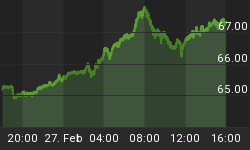BIG PICTURE - Lets face it, the era of easy money and cheap oil has come to an end. And if my assessment is correct, this transformation will have a significant impact on the global economy.
There is no doubt in my mind that since the early 1970's the global economic boom has been largely financed by an ever-expanding quantity of money and credit. Once gold was removed from the monetary system in 1971, central banks were free to create as much paper currencies as they wanted. This reckless monetary inflation and credit growth has caused the value of "money" to diminish significantly over the past three decades and created a gigantic boom in global asset prices. Each time an asset "bubble" has burst in the past 35 years, central banks have responded by reducing interest-rates, thereby encouraging even more credit growth which has spawned further speculative manias down the road. This time around, in the aftermath of the Anglo-Saxon housing bust, Mr. Bernanke and his comrades are desperately trying to do the same and the trillion dollar question is whether they will succeed.
In the current circumstances, I suspect it will be extremely difficult for the central banks to further expand credit growth, thereby inflating their way out of trouble. Below I present the reasons why I am doubtful about the continuation of the credit bubble:
First and foremost, in the current credit crisis, the entire banking system is being brought to its knees. This is very different to the previous crises when perhaps a handful of financial institutions or hedge funds got into trouble. Unfortunately, the financial alchemy (creation of structured products, over the counter derivatives, collateralised debt obligations, credit default swaps etc.) over the past few years has been so severe that the entire banking system is now on the verge of a total collapse. So, even if the central banks tried to further inflate the credit bubble by keeping interest-rates low for an extended period of time, I doubt if the commercial banks are in any position to expand their balance sheets. With billions of dollars of write-downs in the past year and humungous "Level 3" liabilities still undisclosed, the commercial banks have no other option but to try and repair the damage to their balance sheets by tightening credit standards. So, I doubt very much if they (for the foreseeable future) will participate in the central banks' sponsored credit and inflation agenda.
Secondly, I also happen to think that as a result of so many ridiculous tax-payer sponsored bail-outs of Wall Street banks, the US government and regulators will tighten their grip over the ministry of inflation (the banking industry). Therefore, tighter regulation in the months ahead will also prevent the commercial banks from inflating the credit bubble further.
Another reason why I believe we have reached the inflection point in this credit cycle is the state of the US Dollar. With the US Dollar trading at record-lows against major world currencies and soaring energy and food costs, I doubt very much if the Federal Reserve is in a position to lower interest-rates further. In fact, I would argue that the situation is totally out of the Federal Reserve's control and the entire global economy now depends on the mercy of the owners of US Treasuries. I have to admit that so far, given the amount of bail-outs and the state of the US Dollar, holders of US government bonds have been rather well behaved. However, it may only be a matter of time before foreign holders of US Treasuries start liquidating their holdings. When that occurs, long-term interest-rates in the US would rise rapidly and the Federal Reserve would have no other option but to raise its Fed Funds rate.
Finally, given the level of indebtedness of the US consumer and falling asset prices, I wonder how the average American household would be able to take on even more debt. Once the technology bubble burst at the turn of the millennium and the Federal Reserve lowered interest-rates, Americans were quick to borrow and speculate in real-estate. However, this time around in the aftermath of the housing bust, even though the cost of borrowing has been reduced, Americans are not going deeper into debt. Figure 1 shows that US bank credit peaked earlier this year and is now in a decline. So, if American households are really tightening their belts and repaying their outstanding debt, there is no way the credit bubble would continue to inflate.
Figure 1: US bank credit is contracting
Source: www.yardeni.com
It is my observation that we have now entered a new era of credit contraction and deleveraging. The abrupt bursting of the credit bubble is likely to have a profound impact on asset prices in the West. If my view is correct, we are likely to see a period of poor economic growth and deflating asset prices in the developed world. The US economy is clearly struggling, Europe faces its own problems and Japan cannot seem to turn things around. So, I would not advise you to invest your capital in stock markets or real-estate in the industrialised nations.
There can be no disputing the fact that US financial assets have provided disappointing returns since the beginning of this decade. It is worth noting that even though the Dow Jones index is flat in nominal terms since 2000, it has lost more than half of its value against gold over the same period. At the turn of the millennium, the level of the Dow Jones could buy over 40 ounces of gold. Eight years later, the level of the Dow Jones can only buy roughly 12 ounces of gold! Clearly, gold has been a much better investment than US stocks over the past 8 years. In the years ahead, I expect to see further underperformance of financial assets and maintain my position that hard, tangible assets will continue to provide superior returns.















